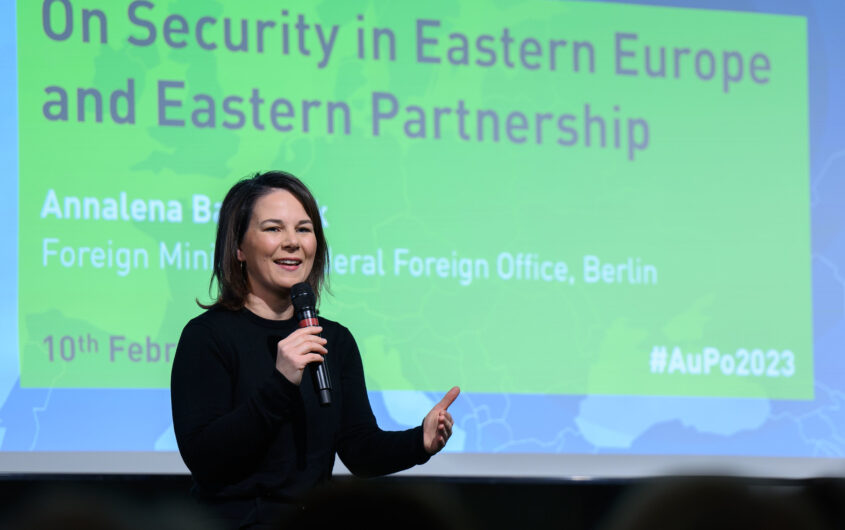
Heinrich-Böll-Stiftung via Flickr
Worth the Wait?

John Michaud
AGI/Halle Foundation Intern
John L. Michaud is a research intern at AGI for the spring of 2022. He provides writing and research support to AGI's programs, monitors the media, documents meetings and events, and assists with database management.
Mr. Michaud is pursuing an MA in International Affairs at American University, with a focus on U.S. foreign policy and transatlantic relations. He has completed coursework on topics including U.S. security strategy, foreign policy institutions, and nationalism. In the summer of 2023, he will spend a semester at Freie Universität Berlin, where he hopes to solidify his German language skills and gain a better understanding of German and European perspectives on security policy.
Mr. Michaud graduated from the University of Virginia with a BA in Foreign Affairs and minor in German. As an undergraduate, he spent a semester studying the European Union in Freiburg, Germany. Prior to graduate school, he worked at National Journal, where he led a research team dedicated to profiling top policymakers in Washington and beyond. He grew up just outside of the Beltway in Fairfax County, Virginia.
The development and potential impact of Germany’s forthcoming national security strategy
It’s almost here. After missing the promised delivery target of December 2022 and the backup deadline of the 2023 Munich Security Conference, Germany’s ruling coalition is reportedly close to an agreement on its much-anticipated national security strategy. Germany has released strategy documents before, such as the 2016 White Paper on German Security Policy, but it has never published a comprehensive national security strategy integrating the perspective of all of its foreign policymaking agencies (like every U.S. administration does). Announced in the Ampelkoalition’s (traffic light coalition) coalition agreement, the national security strategy is expected to incorporate the viewpoints of a wide variety of stakeholders, including German citizens through a public dialogue.
Russia’s invasion of Ukraine prompted Germany to rapidly reorient its foreign policy. Days after the invasion, Chancellor Olaf Scholz gave his famous Zeitenwende (sea-change) speech, in which he declared that Germany must strive for a “powerful, cutting-edge progressive Bundeswehr that can be relied upon to protect us.” To achieve this goal, Scholz announced a 100 billion euro “special fund” for the Bundeswehr and that Germany would spend more than 2 percent of its GDP on defense in 2022 and thereafter. Events had forced the Scholz government down a particular path before it had the luxury of defining German foreign policy on its own terms.
Development process
Against the backdrop of deepening German military and civilian support to Ukraine in a full-scale European war, the process of developing the strategy formally began in March 2022 under the leadership of the Foreign Ministry. Foreign Minister Annalena Baerbock announced her intention to “shape a broad and participative process” that would include the different federal ministries, the Bundestag, and other “national and international partners.” She identified three “crucial elements” of security that the strategy would address: protection from war and violence, support for democracy and freedom, and solutions to global sources of instability such as climate change. Baerbock led the public input phase of the strategy development, a series of intensive conversations with citizens across Germany that culminated in September.
As the original deadline for the strategy’s publication approached in December, disagreements between coalition members began to surface. Tagesspiegel reported that thirty different points in the Foreign Ministry’s draft remained “open” and that the ministries had yet to decide on crucial points such as China policy. Dr. Henning Hoff pointed to a possible power struggle within the coalition, suggesting that Chancellor Scholz did not “want to be bound by a detailed document” produced by a “Green-led ministry.” The February 2023 Munich Security Conference, set as a new deadline, also passed without a finished strategy.
The very existence of the strategy could promote more cohesive foreign policymaking… With a national security strategy in place, ministers and their departmental staffs will be under more pressure to make policy decisions in line with the principles and objectives agreed to by the coalition.
Tension over who should determine German security strategy manifested in the debate over the institutional home for a proposed national security council. This body would have coordinated German foreign policymaking between agencies, with its own staff, assuming a similar role to the U.S. national security council. Scholz reportedly wanted the council housed in the chancellery, while Baerbock preferred that it rotate among ministries. In the end, the parties agreed to drop the council entirely, eliminating one of the major sticking points preventing a deal on the strategy. It is not yet clear what, if any, other institutional reforms will make it into the strategy.
Finally, Politico reported in March that the coalition had resolved the impasse over whether to commit in the national security strategy to spending 2 percent of GDP on defense. Scholz had made this commitment for 2022 in his Zeitenwende speech but later backed off from any specific timeline. Per the report, the Greens gave up their opposition to the 2 percent commitment in exchange for more spending on “soft power measures.” The strategy is now expected to be published sometime in April.
How might the strategy impact German foreign policy?
The strategy is likely to set the course for German foreign policy for the rest of the Scholz government, and perhaps beyond. While many of the specifics of the strategy are not yet known, Scholz described his vision for a revamped German foreign policy in a December article for Foreign Affairs. From Scholz’s point of view, Germany must ensure Europe’s security (and thereby its own) while striving to preserve the “rules-based international order” that has made Germany so prosperous. To guarantee European security, Scholz promised that Germany would invest in its own defense capabilities, support deeper European defense cooperation, promote energy security through renewable energy, and advocate for EU-level voting reforms to enhance the bloc’s ability to make foreign policy decisions quickly. To preserve the favorable international order, Germany would work closely with traditional allies like the United States, expand partnerships with like-minded countries in the Global South, and pursue cooperation with China while raising disagreements on issues like human rights and trade.
This formulation of China policy suggests that Scholz believes Germany can prod China to abide by the rules of that order while keeping its economic relationship intact, an assumption that critics have compared to Germany’s failed Russia strategy. Meanwhile, coalition partners such as Baerbock and Vice Chancellor Robert Habeck have more forcefully advocated for overhauling Germany’s economic relationship with China; a leaked draft of Germany’s China strategy, produced by Baerbock’s Foreign Ministry, called for reducing Germany’s economic dependency on China and more strictly regulating trade and investment in infrastructure and sensitive industries. Scholz’s controversial December visit to Beijing, in which he tended to the commercial relationship and brought up concerns over human rights and Taiwan, may represent a test case of his approach. As Dr. Tim Rühlig notes, there is broad agreement within the coalition that Germany should “reduce its strategic dependencies” on China; the question is “how quickly and how far” it should go in this direction. The national security strategy and China strategy will provide more substance to these themes and clarify how Germany intends to balance its economic ties with China against geopolitical concerns.
One of the few known specifics of the national security strategy, the 2 percent commitment could transform German defense, although it may take several more years for Germany to reach that level of spending in practice. First, a sustained infusion of funding should over time address some of the Bundeswehr’s most pressing readiness and capability issues so that Berlin can contribute to Europe’s security on a level commensurate with Germany’s size and economic heft. Second, a national security strategy that anchors military deterrence as a necessary component of German security will increase the prominence and influence of the defense minister, a role that has often been marginalized. Boris Pistorius—in office only since January 2023—already demonstrated the effect that an empowered defense minister can have on German policy when he successfully advocated for sending German Leopard tanks to Ukraine. Third, a larger annual defense budget will by definition increase the Bundestag’s attention to defense issues, which will generate more debate and engagement on topics like defense strategy, procurement, and Germany’s international responsibilities.
Finally, the very existence of the strategy could promote more cohesive foreign policymaking. In German coalition governments, cabinet ministers will likely differ in their policy approaches, and they have more latitude than their U.S. or UK counterparts to pursue their own policy agendas. With a national security strategy in place, ministers and their departmental staffs will be under more pressure to make policy decisions in line with the principles and objectives agreed to by the coalition. The opposition parties will have a standard to hold them to in public debate, acting in some cases as a sort of external enforcement mechanism. Foreign policymaking could become more unified without the chancellor having to assert his or her ultimate power to set the line of government policy—an authority that chancellors use only sparingly.
Conclusion
The national security strategy represents a major effort by three political parties to define Germany’s approach to a rapidly altered global landscape. Given Germany’s history, system of government, and longstanding aversion to geopolitics, this has been no easy task. The strategy will likely set a broad foreign policy course in which Germany will aim to secure Europe and preserve an international system that it has benefitted from more than perhaps any other major country. This includes Germany’s approach to China, a country that Germany’s economy relies upon yet poses a threat to the rules-based international order Germany thrives in. A written commitment to spend 2 percent of GDP on defense will have a lasting impact on Germany’s military capabilities, as well as the relative prominence of the defense minister and defense topics in German policymaking. The strategy’s very existence might encourage cohesion among the ministries in Germany’s decentralized, coalition-based governing system. The final parameters of the strategy are unknown, and any promises (particularly on defense spending) must be backed up by budgetary commitments. However, from what we know already, Germany’s first national security strategy seems poised to institutionalize at least some of the changes prompted by the Zeitenwende.








